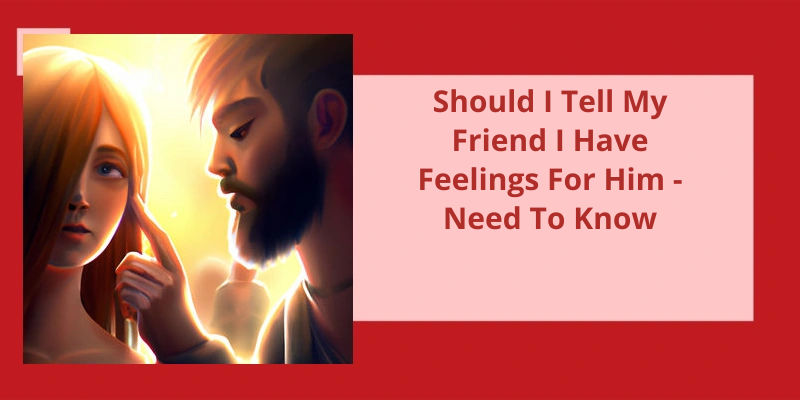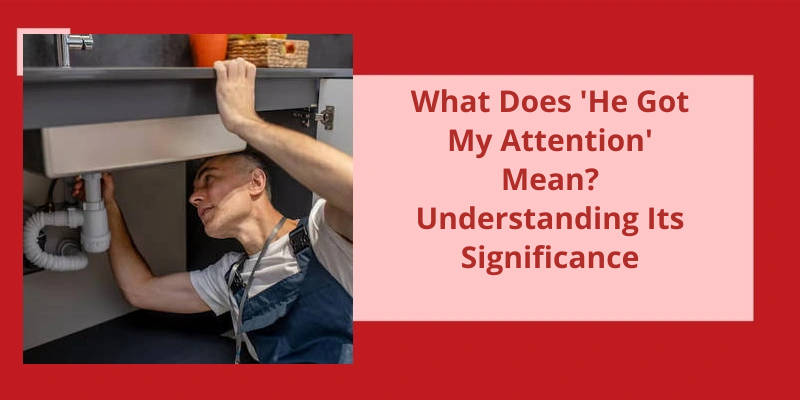It's natural to develop feelings for a close friend, as you spend a significant amount of time together and share deep emotional connections. Deciding whether or not to tell your friend about your feelings requires careful consideration, as it can potentially alter the dynamics of your relationship forever. The fear of rejection and the possibility of losing a valued friend can be overwhelming, leaving you unsure of how to proceed. Nevertheless, suppressing these intense emotions might hinder your personal growth and prevent you from finding happiness. Hence, it's essential to weigh the risks against the potential rewards, keeping in mind the importance of open communication, trust, and respect. While there’s no definitive answer, arming yourself with knowledge, understanding your motivations, and assessing the dynamics of your friendship will help you make an informed decision. With the right approach, honesty, and sensitivity, you can navigate this complex situation and find clarity on whether expressing your feelings is the right path to take.
Should You Tell Your Friend You Have Feelings for Them?
Deciding whether or not to tell your friend you’ve feelings for them can be a complex and nuanced situation. There are several factors that need to be taken into consideration. First and foremost, it’s crucial to assess the availability of your friend. If they’re already in a committed relationship or clearly not open to a romantic connection, revealing your feelings may only complicate the friendship and cause unnecessary tension. Similarly, if you’re unsure about your own emotions or hesitant about pursuing a romantic relationship, it might be wiser to refrain from sharing your feelings.
Another crucial aspect to consider is the potential consequences of disclosing your emotions. Are you prepared for the potential outcome of your friend not reciprocating your feelings? Can you handle the potential discomfort that might arise from confessing and risking the existing friendship? It’s important to be honest with yourself and evaluate if you’re ready to face rejection or potential changes in the dynamic of your friendship.
Furthermore, it’s essential to take into account the nature of your friendship and the level of trust and openness between you and your friend. If you’ve a strong and open line of communication, discussing your feelings might be more feasible and less overwhelming. However, if your friendship is more casual or if you sense that your friend might not be receptive to such a conversation, it may be better to reconsider and maintain the status quo.
The Importance of Timing Timing Plays a Crucial Role in Determining Whether or Not to Tell Your Friend About Your Feelings. Consider the Right Moment to Broach the Topic, Taking Into Account Both Your Own Emotions and the Current Circumstances in Your Friend’s Life.
The importance of timing can’t be overstated when it comes to revealing your feelings to a friend. It’s essential to carefully choose the right moment to discuss your emotions, considering both your own feelings and the circumstances in your friend’s life.
When you find yourself with romantic feelings for your best friend, it can be a difficult and delicate situation to navigate. Before taking any action, it’s important to first understand your motives behind wanting to pursue a romantic relationship. Once you’ve clarity on your feelings, assess the situation and determine if the timing is right. Choose a comfortable and private setting to have an open and direct conversation with your friend about your emotions. It’s crucial to be prepared for any reaction they may have and to listen to their response with an open mind. Ultimately, respect their decision and understand that it may not align with your own desires.
How Do I Tell My Friend I Have Feelings for Her?
Deciding whether or not to tell your friend that you’ve feelings for them can be a daunting task. Before making any moves, it’s important to determine your motives for wanting to pursue a romantic relationship with them. Are your feelings genuine and based on a deep connection, or are they fleeting and based on temporary attraction? Understanding your own emotions will help clarify your intentions and guide your approach.
Assessing the situation is crucial before taking any action. Consider your friends own relationship status and emotional availability. Are they currently in a committed relationship or going through a difficult time? It’s essential to respect their boundaries and not disrupt any existing dynamics that may be in place.
Choosing the right time and place to have this conversation is vital. Select a comfortable and private setting where both of you can speak openly without interruptions. Ensure that they’re in a relaxed and receptive state of mind so that they can fully absorb and respond to your honesty.
When expressing your feelings, it’s best to be clear and direct. Avoid beating around the bush or sending mixed signals. Clearly articulate your emotions and why you believe a romantic relationship could be beneficial for both of you. It’s crucial to communicate your intentions openly and honestly, without putting undue pressure on your friend to reciprocate your feelings.
Being prepared for any reaction is essential, as you can’t control how your friend will respond. They may feel shocked, surprised, or need time to process the information. Give them the space and understanding they need to gather their thoughts and emotions before expecting a response.
Listening to their response is equally important. Allow your friend to express their thoughts and feelings without interrupting or becoming defensive. Be empathetic and understanding, even if their response isn’t what you hoped for. Their feelings and perspective are valid, and it’s crucial to respect their decision, whether they choose to pursue a romantic relationship or remain friends. Ultimately, the friendship should be the priority, and both parties should feel comfortable and respected throughout the process.
Having the courage to express your feelings to a friend can be difficult, but it’s important for personal growth and understanding. If you find yourself wanting to take your friendship to a deeper level, finding an honest and simple way to communicate your emotions is crucial. Whether it’s saying, “Listen, I think I’ve feelings for you” or “I’ve been feeling recently like maybe I want us to be more than friends,” being straightforward and sincere is key. Trusting that a good friend will handle the conversation with tact and sensitivity is essential and can lead to a deeper connection or provide clarity for both parties involved.
How Do I Express My Feelings to My Friend?
When it comes to expressing your feelings to a friend, it’s essential to be honest and straightforward. Instead of beating around the bush, choose a simple and genuine way to say it. You might start by saying something like, “Listen, I think I’ve feelings for you,” or “Lately, Ive been feeling like there might be something more between us.”. By directly addressing your emotions, you avoid confusion or misunderstanding.
If your friend is truly a good friend, they should understand the significance of this conversation and handle it with tact and sensitivity. They may need some time to process what youre saying, so be prepared for that. It’s crucial not to rush them or expect an immediate response. Give them the space to process their own feelings and consider the potential impact on your friendship.
Throughout the conversation, it’s essential to maintain open and respectful communication. Encourage them to share their thoughts and feelings, and let them know that their response will be valued, regardless of what it is. Remember that they may not have anticipated this revelation, so their initial reaction may not be what you hope for. It’s vital to be prepared for a range of responses and to approach the conversation with understanding and empathy.
Additionally, consider the timing and environment in which you’ve this conversation. Choose a private and comfortable setting where both of you can speak openly without distractions or time constraints. This will allow both of you to fully express yourselves and have a meaningful conversation.
Remember that expressing your feelings to a friend always carries some level of risk, as it may change the dynamics of your relationship. However, being open and honest about your emotions can also lead to a deeper understanding and potentially a stronger connection. Ultimately, the key is to approach the conversation from a place of genuine care and respect for your friend and the friendship you share.
Assessing the Potential Risks and Benefits of Expressing Your Feelings to a Friend.
Assessing the potential risks and benefits of expressing your feelings to a friend is an important aspect to consider. On one hand, being open and honest about your feelings can lead to a deeper, more fulfilling connection with your friend. It might also give you the opportunity to explore a romantic relationship with them if they’ve similar feelings.
However, there are potential risks involved in expressing your feelings. Your friend may not reciprocate your feelings, which could potentially lead to an awkward or strained friendship. It’s also possible that they may not feel the same way and may need time and space to process your confession.
Before deciding whether or not to tell your friend about your feelings, it’s important to carefully consider the dynamics of your friendship, your own emotional readiness for a potentially difficult outcome, and whether or not it’s worth the potential risks to your friendship.
Entering into a friends with benefits (FWB) arrangement can be tempting when a strong attraction exists between two individuals. However, embarking on such a connection with someone you already have feelings for might not be the best decision. Eventually, this situation tends to lead to emotional complications and potential heartbreak. The essence of a successful FWB relationship lies in the understanding that it will end when it no longer serves either party or when one person becomes more serious with someone else. Evaluating whether the benefits outweigh the risks becomes crucial in navigating such delicate terrain.
Should You Be Friends With Benefits With Someone You Have Feelings For?
When it comes to navigating the complex terrain of relationships, the question of whether or not to become friends with benefits with someone you’ve feelings for can be a tricky one. While the idea of engaging in a casual, no-strings-attached arrangement might seem appealing at first, it’s important to consider the potential consequences.
One crucial factor to take into account is the possibility of developing deeper emotions for your friend. It’s possible that your emotions could intensify, leading to heartache or unrequited love.
Furthermore, a successful friends with benefits relationship requires clear boundaries and open communication. If youre harboring feelings for this person, it may become challenging to separate the physical aspect from the emotional one. This could lead to misunderstandings, jealousy, and ultimately damage the friendship.
It’s essential to remember that a friends with benefits arrangement is by nature a transient one. Ideally, it should end when one or both parties no longer benefit from it or when one person enters into a more serious dating relationship. If you’ve genuine feelings for your friend, this could become a painful reality to face.
To protect yourself emotionally, it may be wise to have an open and honest conversation with your friend about your feelings. By communicating your emotions, you can avoid potential misunderstandings and ensure that everyone involved is on the same page. Remember, honesty is the foundation of any healthy relationship, including a friends with benefits one.
It may lead to more significant emotional involvement and potential heartbreak. It’s crucial to consider the consequences and communicate openly to ensure that all parties are clear on their intentions and expectations. Ultimately, it’s important to prioritize your emotional well-being and make the choice that feels right for you.
The Role of Honesty and Transparency in Maintaining a Healthy Friends With Benefits Relationship
- Clear, open communication is essential for a healthy friends with benefits relationship.
- Honesty about intentions and expectations helps avoid misunderstandings and hurt feelings.
- Transparency in discussing boundaries and limits ensures both partners feel comfortable and respected.
- Being truthful about emotions and changes in feelings can prevent complications and maintain a strong foundation.
- Building trust through honesty and transparency strengthens the bond and enhances the overall experience.
- Being open and sincere about individual needs promotes satisfaction and enjoyment for both partners.
- Respecting each other’s feelings and being truthful about any concerns or issues is crucial for a lasting and healthy friends with benefits relationship.
However, there are times when remaining friends with someone you’ve feelings for can be a positive and rewarding experience. It all depends on the individuals involved and their ability to navigate through the complex emotions that may arise.
Is It Bad to Stay Friends With Someone You Have Feelings For?
Is it bad to stay friends with someone you’ve feelings for? The answer to this question isn’t so straightforward. It ultimately depends on your individual situation and emotional well-being. Moving on from romantic feelings might be necessary to maintain a healthy friendship, especially if the other person doesn’t feel the same way.
Staying friends with someone you’ve a crush on or love can be incredibly challenging. Each encounter can remind you of your unrequited feelings, causing emotional pain and distress. It can feel like a constant cycle of heartache, as your feelings aren’t reciprocated. This can take a toll on your self-esteem and overall happiness, making it difficult to truly enjoy the friendship.
On the other hand, maintaining a friendship can also have it’s benefits. Your friend may provide emotional support, companionship, and a sense of familiarity that you value. They may be someone you trust and confide in, which can be hard to find. Additionally, staying friends allows you to continue to spend time together and enjoy shared interests and activities.
However, it’s essential to evaluate whether these benefits outweigh the emotional toll it takes on you. Are you truly able to move on and accept that your feelings won’t be reciprocated? Can you navigate potential changes in their romantic life without feeling hurt or jealous? It’s crucial to consider your emotional well-being and assess whether the friendship is truly fulfilling for you.
If remaining friends becomes too painful or hinders your ability to move on, it may be necessary to take a step back. It’s okay to prioritize your own emotional health and well-being. You can create distance, take time for self-reflection, and focus on healing from these unrequited feelings. Ultimately, the decision about whether to stay friends or not should be based on what’s best for you and your emotional growth.
Coping Strategies for Staying Friends With Someone You Have Feelings For
- Open and honest communication
- Setting boundaries
- Taking space and time away from each other
- Seeking support from friends and family
- Engaging in self-reflection and self-care
- Focusing on other friendships and relationships
- Distancing from situations that trigger feelings
- Redirecting romantic feelings towards other interests
- Understanding and accepting the situation
- Being patient with yourself and the other person
Conclusion
When considering whether or not to confess your feelings to a close friend, it’s important to weigh the potential risks and rewards. While the fear of rejection may be daunting, it’s often better to be honest and transparent about your emotions rather than repress them. By expressing your feelings calmly, respectfully, and privately, you give your friend the space to process this newfound information and respond in a genuine manner. Ultimately, keeping your emotions concealed could lead to missed opportunities and lingering regrets. However, it’s crucial to remember that the outcome may not always align with your desires. It’s essential to prepare yourself for any response, be it reciprocation or a change in the dynamics of your friendship. Ultimately, communication and honesty are vital in any relationship, and the ability to express oneself authentically is an integral part of personal growth and building stronger connections.






